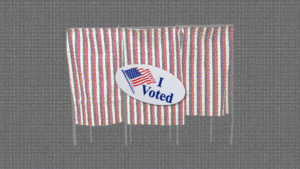Brandon Finnigan watched the 2004 election from his college dorm room. He was unhappy that results came in slowly and viewers only had access to one source for election data.
“I thought, ‘Maybe there is an alternative way for election information and data to be available in the United States,’” Finnigan said.
To those ends, Finnigan founded Decision Desk in 2012. The service collects data and results on elections from the presidential race down to local school boards in all 50 states. Their data is used by outlets and publications across the country.
The McCourt School of Public Policy on the Capitol Campus served as the organization’s data entry headquarters for the 2024 election, with Georgetown students helping their election day work.
“The McCourt School was the obvious choice for us, with its emphasis on data and ethics and its community of students drawn to Washington, and we’re excited to help the School build out its election programming and experiential learning in election-focused data science,” Scott Tranter, director of data science at Decision Desk HQ wrote in a statement to Georgetown University.
Decision Desk gathers election day information and data in a variety of ways, working with ground reporters, data scraping programs, and remote entry staff. The team’s workers combs through webpages, Twitter feeds, faxes, emails, and phone calls.
One student worker, Alex Li (CAS ’28), comes with years of experience as a poll watcher and Voter Service Director for the League of Women Voters’s Alameda County chapter.
“It was really interesting to see just how much goes into supporting everyday life and how much the government does,” Li said. “I was watching returns come in for everything from the mayor to water district board members.”
Students were assigned five counties to monitor throughout election night, spending a six hour shift combing through PDFs and web pages, as well as calling county election clerks.
“You’re the only two people out of a third of a billion Americans who actually know the outcome for that moment in time for that part of the United States,” Finnigan said. “And that happens over and over and over. It’s these mini moments of magic, and that’s the other thrilling part of the job.”
Students and other workers track votes in counties across America, while Decision Desk analysts create predictive models using early voting and registration data. Decision Desk was the first results provider to call the 2020 presidential election.
Finnigan had to wait 8 years for technology such as dating scraping software to catch up with his 2004 musings. At the time, the Associated Press was the only service providing election returns, creating an information monopoly in the sector.
“So as technology has grown, we grew with it, and now we’re providing returns and eventual race calls for 30,000 elections across the United States,” Finnigan said.
Now only three entities provide election results in the U.S.: The Associated Press, Decision Desk HQ and Edison Media Research. Since its founding, Decision Desk has grown to service media clients such as The Hill, The Economist, and the Huffington Post, but also local media outlets as well.
“We deliver to a lot of local television stations that need to cover races all the way down to dog-catcher,” Finnigan said.
While Decision Desk’s mission is to provide real time information on election results, Finnigan said that the incorporation of student workers instills a sense of respect for the American electoral system and those who work to maintain it. This particularly comes from contact between students and election officials, Finnigan added.
“Talking to clerks gives you a better appreciation and understanding for their job and what they’re doing,” Finnigan said.
Finnigan believes it is this “magic” that keeps many of his ground reporters and remote entry workers coming back election after election.
Li especially appreciated their experience in light of the results of the presidential election.
“It was good to see democracy working on a local level even when there’s a candidate looking to blow it up on the national level,” Li said.
Finnigan also believes in the nonpartisan nature of Decision Desk’s work to inspire his workers as well as the country as a whole.
“It’s one of the few spaces where people can come together, work on something, and put politics aside,” Finnigan said, “It’s just about getting the information out there. It’s not about who we’re fighting for.”






